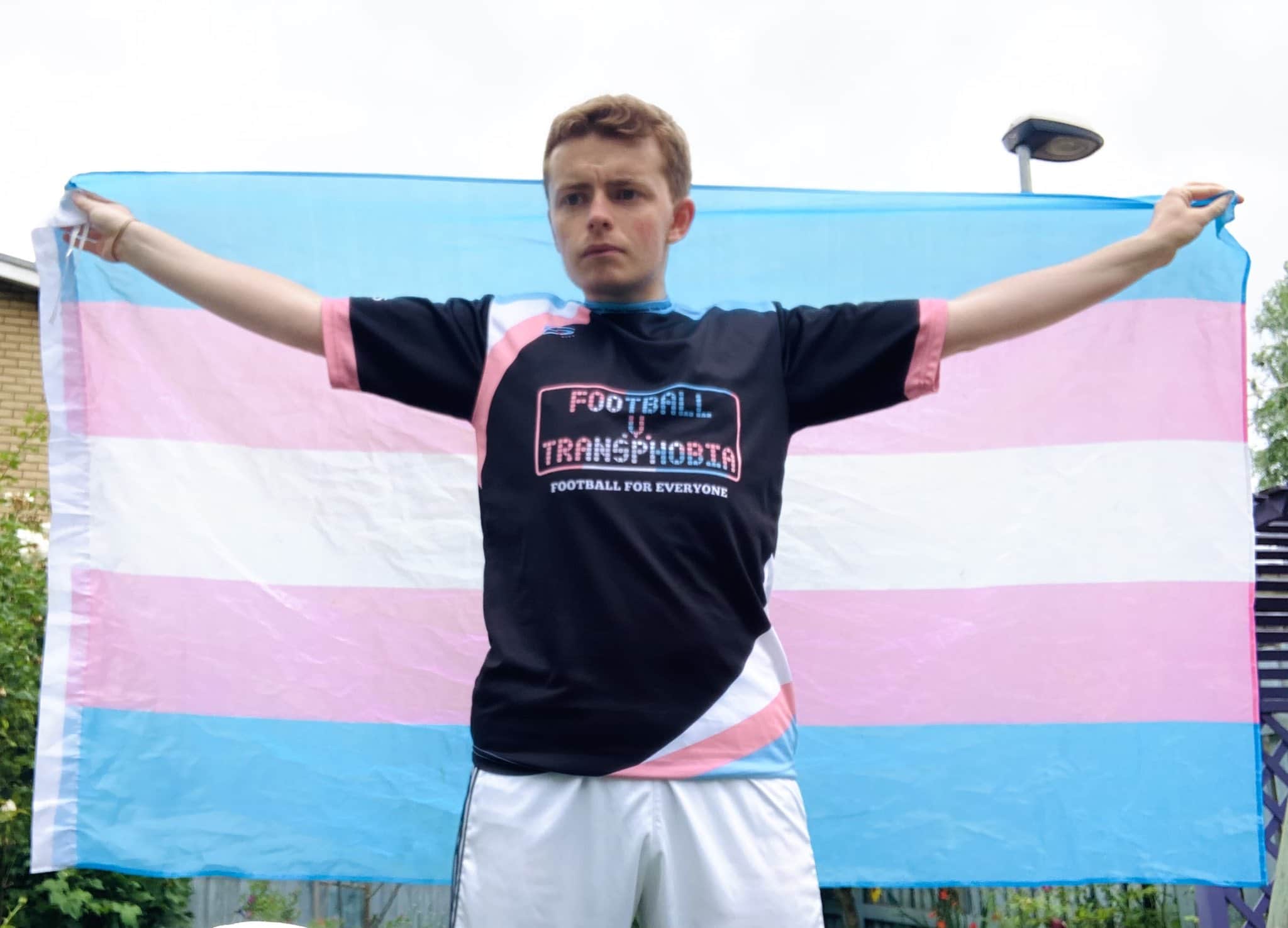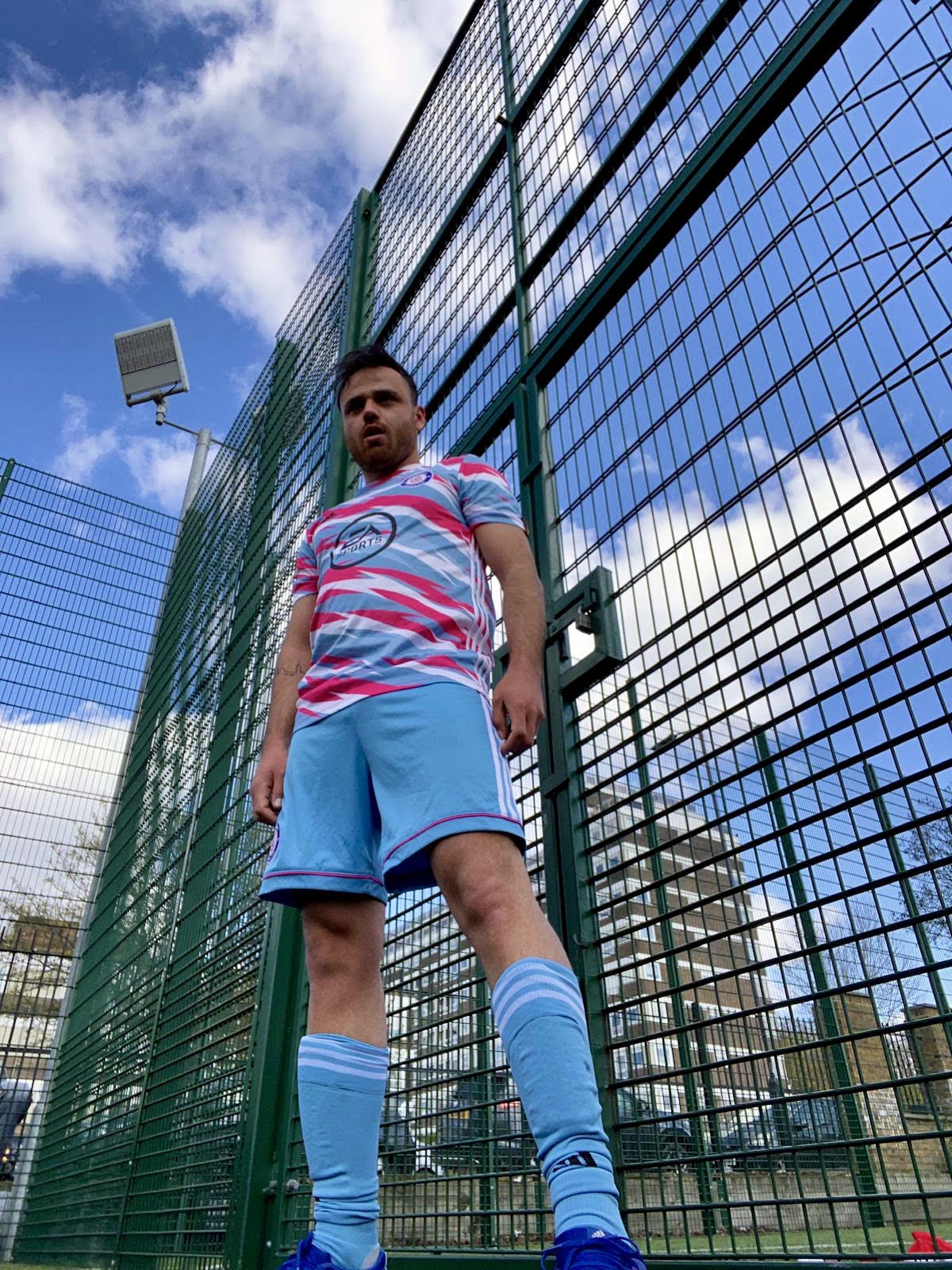With football coming home, proud LGBT+ fans share what the beautiful game means to them

Germany fans with rainbow flags outside the Allianz Arena ahead of the UEFA EURO 2020 match against Hungary (Kerstin/Joensson/AFP)
Today England meets Italy in the UEFA Euro 2020 final, concluding a nail-biting tournament that’s seen LGBT+ issues thrust unexpectedly into the front line.
With UEFA confiscating supporters’ Pride flags, banning rainbow advertisements and nixing Germany’s rainbow-lit stadium, queer football fans have found their very identities politicised in a game that organisers never intended to be political in the first place.
It’s ignited an age-old discourse about LGBT+ inclusion and homophobia in football, a sport still plagued by prejudice in the terraces even as players on the pitch champion equality.
Now as the eyes of the world turn to the big match, PinkNews spoke to LGBT+ players and fans about the beautiful game that somehow brings us all together, in spite of the differences.
Natalie Washington
Natalie plays for Rushmore Community FC and leads the Football v Transphobia campaign to tackle anti-trans hate in the game.
Football gives me a space away from work or activism, a place where I can just be active and forget about everything else. But there’s also a really great social side of it – it helps combat isolation in a big way. And that’s true for me, especially during my transition.
I started transitioning eight years ago, and it was a very, very stressful time. There was a lot of stuff going on in my life and football was a way to get away from all that, to forget it all and enjoy being part of something where gender identity didn’t really matter.
Since transitioning I’ve been quite reticent to physically attend games as I’m worried about how I’d be treated in the stadium.
It’s like any fandom: You’ve got that shared culture that brings you together and helps you see past differences, but also helps you embrace those differences as well. You meet all sorts of people when you coalesce around a sport, and I really like that aspect of it.
Sadly, LGBT+ people do experience a lot of discrimination in football, and although I’ve always been welcomed by women’s teams, the culture at men’s games isn’t as inclusive. Even before I transitioned I had other fans policing my appearance – this idea that you’re “not manly enough” to be here.
Since transitioning I’ve been quite reticent to physically attend games as I’m worried about how I’d be treated in the stadium because of the way look and sound. There’s a lot that goes on to make people that don’t want to or are unable to fit those expected norms feel uncomfortable.
Thankfully, for me, the positives in football far outweigh the negatives. But the negatives are there, and I would prefer that they weren’t.
Di Cunningham
Di is organiser of the Proud Canaries, Norwich City’s LGBT+ fan group, and a founding member of Three Lions Pride.
I got my first Norwich City season ticket in 1992, and within weeks I just felt part of it. It gave me a real sense of belonging. But then I had an epiphany: I realised I was compartmentalising my life, because football’s really important to me, but so is my LGBT+ identity – and I was parking that at the turnstile when I went into the stadium.
When we formed Three Lions Pride, there was a security and an alternate sense of belonging that I really needed from football. We now have over 50 of these LGBT+ fan groups and I think things are definitely starting to improve.
I’ve never seen this kind of unity before.
We’re seeing some real guerrilla allyship at this tournament, and I think what’s triggered that is UEFA’s mixed messaging around LGBT+ issues. In their policies they claim to be egalitarian, but they’ve been consistently repressing the rainbow symbol throughout the games. So that’s galvanised everybody into saying, “This is not politics, this is human rights.” And I’m just so proud of that. I’ve never seen that kind of unity before.
I was lucky enough to be at the England match the other day, and I realised I’d never seen such a diverse crowd. Young, old, disabled, able-bodied, all different ethnicities – I’ve never seen that at a competitive match to that degree. [Gay Gooners co-chair] Joe White came in full makeup and all these fans were coming up and saying hi. It was wonderful.
For me, being in that stadium and seeing people interact with them in a positive way as an overtly queer fan, that was football coming home – because my country was truly represented in that crowd. It’s what we’ve always wanted.
Arthur Webber
Arthur is a member of Arsenal’s Gay Gooners, the UK’s first and the world’s largest LGBT+ football supporters group.
Football has always been an integral part of my identity. My mum’s favourite jokey explanation for my transition is that my dad wrapped me in a France 1998 World Cup scarf and made me watch it.
I played for my school girls’ team until I realised I was trans in year 9 and, although I didn’t tell anyone at this point, it didn’t feel right to carry on. I was the lone “girl” in a boys PE set in year 11 to play football – teachers didn’t know I was trans, my classmates did.
When I came out as trans to my work colleagues, it was initially a little awkward because they were supportive, but didn’t know if something had changed. A quick conversation swerve to the previous week’s Arsenal match assured everyone that it hadn’t.
I’ve always felt very safe with Arsenal as a queer person. In fact, I started supporting them because a boy I fancied when I was six also supported them. He switched to Spurs the following season, but Arsenal stuck with me.
GayGooners’ out and proud presence at London Pride and at games has very much assured me that when the time comes that I see my team play in person for the first time, I’ll be coming home.
Gabrielle Certini
Gabi plays for the Unity Team, part of Stonewall FC, Britain’s top-ranking LGBT+ football team and the first of its kind.
I started playing football when I was five-years-old and I’ve been chasing the ball ever since. I’ve always been part of football teams and played at a high standard when I lived in Florence.
As a kid I used to go with my dad to support my favourite team (Fiorentina) and I’ll always be grateful to him that he made me so passionate about my team. My father called me Gabriele in honour of Gabriele Omar Batistuta, who in the year I was born was the striker of Fiorentina.
None of my parents or friends know I’m gay, so my football team is the only support I have.
For me, being part of Stonewall FC is synonymous with pride. The club makes me feel proud and part of a family that doesn’t judge you and that appreciates you for who you are.
None of my parents or friends know I’m gay, so Stonewall FC is the only support I have and is helping me on my personal journey. I’ve found fantastic friends and teammates who welcomed me from day one with contagious positivity, and I don’t see any difference to non-LGBT+ teams; the environment just feels more welcoming and accepting.
I came from a football environment where I had never been in contact with LGBT+ people. Through Stonewall FC I found people who were very helpful and who have welcomed me with so kindly, immediately making me feel part of the family.
My best footballing memory was scoring my first goal for Stonewall FC. It was a free kick which I lifted over the wall beautifully – it was a special moment for me.
Rachael Wall
Rachael plays for Stonewall FC in the newly-formed Women and Non-Binary Team.

The proud players of Stonewall FC’s Women & Non-Binary team (Image supplied: Stonewall FC/ Lawrence Bury)
Like many others, I’ve grown up playing and watching football since I was a kid. It’s been a large part of my life for so many years, even when I had to play with the boys because there was no girl’s or women’s team.
For me, the sport means so much – whether that’s the emotions of winning and losing, to meeting incredible people on and off the pitch. I have many fantastic memories of playing the game, and have been lucky enough to meet my best friend through football at university.
Joining Stonewall FC’s Women and Non-Binary Team has been one of the most positive experiences for me in the sport, as it’s enabled me to join a club which provides a safe space for all members and is actively advocating for LGBT+ rights within football. Our kit is designed with the colours of the trans flag and I feel a real sense of pride in wearing it on the pitch, knowing how important visibility can be.
I’m lucky in that I’ve always felt comfortable being openly LGBT+ when playing and watching women’s football around the country. I’m a lot more cautious in a stadium watching men’s football, as I’ve heard the discriminatory slurs and chants from fans. As an openly queer woman, I don’t yet feel safe to be fully open about my sexuality for fear of someone making a homophobic comment or something worse.
Our kit is designed with the colours of the trans flag and I feel a real sense of pride in wearing it on the pitch.
Euro 2020 has shown there’s still so much to do to make football a truly LGBT-inclusive sport. In this tournament alone we’ve seen LGBT+ flags removed from fans in stadiums, LGBT+ adverts banned from advertising boards and Germany disallowed from lighting a stadium in rainbow colours.
Governing bodies must step up and take meaningful, positive action to show they really care about making football more inclusive – this includes working directly with clubs and the LGBT+ community to identify improvements.
You can follow Stonewall FC on Instagram or on Twitter. If you or a friend would like to get involved, complete the form here: www.stonewallfc.com/join-us.





